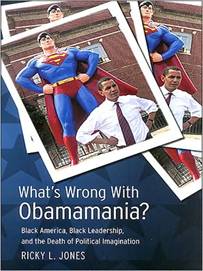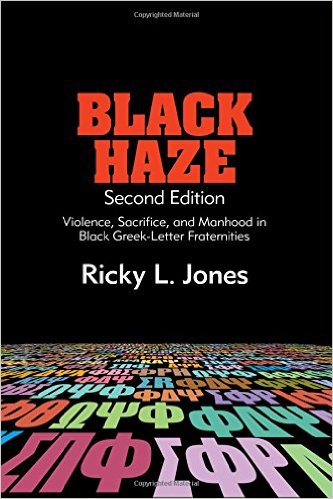Black Haze
Violence, Sacrifice, and Manhood in Black Greek-letter Fraternities,
Expanded 2nd Edition
In What’s Wrong with Obamamania?, Jones places Obama’s run for the presidency in the context of deep and often disturbing shifts in black leadership since the 1960s. From Charles Hamilton Houston to Thurgood Marshall to Jesse Jackson, from prosperity preachers to megachurches, from W. E. B. Du Bois’s Talented Tenth and civil rights advocates to Black Entertainment Television and hip-hop culture, Jones paints a picture of lowered expectations, cynicism, and nihilism that should give us all pause.
Reviews and Praise for “What’s Wrong with Obamamania?”
“With a critical eye, Jones examines leadership style in the black community within the context of larger philosophical arguments about culture, education, political agency, and expectations. This examination will be useful as we attempt to put Barack Obama, and specifically leadership in the black community, into focus.” — Ronald W. Walters, author of Freedom Is Not Enough: Black Voters, Black Candidates, and American Presidential Politics
“This book is an important contribution to intellectual clarity—a scarce commodity at a time of mania.” — Glen Ford, Executive Editor, BlackAgendaReport.com
“Jones revives a tradition of sharp and clear political thinking and courageous moral engagement.” — Joy James, author of Transcending the Talented Tenth: Black Leaders and American Intellectuals
“Jones uses Barack Obama's presidential campaign to launch a fascinating and well-researched exploration into black leadership in America. The author is thoughtful and balanced in his assessment of the changing nature of black leadership—from W.E.B. Du Bois to Martin Luther King Jr. and Jesse Jackson—and in his evaluation of the challenges facing the black community's newest generation of leaders. Jones contextualizes the Obama campaign as he documents the troubled state of politics in black America, illustrating the enduring effects of slavery and segregation and charting the burgeoning influence of modern megachurches, hip-hop culture and BET. Although Jones raises more questions than he answers, this book makes a compelling case for black leaders to re-examine, augment and sometimes discard old approaches and methods. Jones lucidly enumerates the challenges, choices and limitations Obama will face as he attempts to win the presidency, and provides a level of racial analysis and exploration that is almost entirely absent in the mainstream media.” – Publishers Weekly
"Obama is black but not a 'race man,' a position that has made him 'painfully safe' and unlikely to effect real change in American race relations, from the historic perspective of black leaders from W. E. B. DuBois to Martin Luther King Jr., according to Pan-African scholar Jones. He examines Obama’s political career in the broader context of the post–civil rights generation, with its confusing and conflicting views on racial and personal responsibility, greed and ambition versus social justice. Jones laments how black politics has degenerated from debate about the efficacy of a Talented Tenth to the money-grubbing preaching of prosperity churches and growing division along class lines. Moreover, Obama’s mixed racial heritage and avoidance of discussion of race, until recently, fit neatly into a paradigm that says race and racism are concerns of the past. Even as African Americans celebrate Obama’s viability as a presidential candidate, Jones cautions against the tendency to romanticize black leaders, a tendency that may saddle Obama with unrealistic expectations and unfair criticism when he fails to meet them . . . this is a penetrating look at how race politics has evolved."— Starred review from Booklist
______________________________________________
Black Haze
Violence, Sacrifice, and Manhood in Black Greek-Letter Fraternities
Cover of Black Haze
What's Wrong with Obamamania?
Black America, Black Leadership, and the Death of Political Imagination
Ricky L. Jones' latest work juxtaposes the meteoric rise of Barack Obama with far-reaching—and disturbing—shifts in black leadership in post–Civil Rights America. Barack Obama’s sudden arrival on the national scene created a wave of excitement in American politics, a phenomenon that has been dubbed “Obamamania.”
From the Publisher: The very first 2nd edition in SUNY Press' longstanding African American Studies Series. Are black men naturally violent? Do they define manhood in the same way as their counterparts across lines of race? Are black Greek-letter fraternities among the most dangerous student organizations on American college and university campuses? Can their often-dangerous initiation processes be stopped or even modified and if not, what should be done about them? In his revisitation of the original edition of Black Haze, Ricky L. Jones takes on these questions and more. The original edition was an enlightening and sometimes disturbing examination of American men’s quest for acceptance, comfort, reaffirmation, and manhood in a world where their footing is often unstable. In this new edition Jones not only provides masterful philosophical and ethical analyses but also forces the engagement of a terrifying real world process that damages and kills students with all too frequent regularity. With a revealing new Preface and stunning Afterword, Jones immerses the reader in an intriguing and dark world marked by hypermasculinity, unapologetic brutality, and sometimes death. He offers a compelling book that ranges well beyond the subject of hazing—one that yields perplexing questions and demands difficult choices as we move forward in addressing issues surrounding fraternities, violent hazing, black men, and American society.
The first book solely devoted to the subject of black fraternity hazing.
As a fraternity member, past chapter president, and former national committee representative, Ricky L. Jones is uniquely qualified to write about the sometimes deadly world of black fraternity hazing. Examining five major black Greek-letter fraternities, Jones maintains that hazing rituals within these fraternities are more deeply ingrained, physically violent, and imbued with meaning to their participants than the initiation rites of other ethnic groups.
Because they do not see themselves as having the same political, social, and economic opportunities as other members of society, black fraternities and their members have come to see the ability to withstand physical abuse as the key ingredient in building and defining manhood. According to Jones, hazing in black fraternities is a modern manifestation of sacrificial ritual violence that has existed since ancient times, and the participants view such rituals as an important tool in the construction of individual and collective black male identity.
Reviews and Praise for “Black Haze”
“…provides valuable insights into the reasoning behind hazing, a practice that extends into the realms of sports and even high school, and is relevant for not only fraternity members and officials, but the general public as well.” — The Griot
“…an important contribution … because of the skillful manner in which Jones incorporates and critically analyzes relevant literature and other related scholarly writings … Jones, himself a member of Kappa Alpha Psi, offers personal observations as well as first-hand views and perceptions of hazing.” — Journal of College Student Development
"In Black Haze, Ricky L. Jones skillfully analyzes the culture of pledging and hazing within the ranks of black Greek-letter organizations. Too often, the leaders of these fraternal organizations have tried to prevent the destructive hazing behavior of their members without adequately researching the origins and the systemic reasons for the behavior in the first place. Jones's new research will not only illuminate the subject in the eyes of national fraternal leaders, but will also be a clarion call for action on the ordinary fraternity and sorority member level. For this, Jones's work is invaluable and I highly recommend it." — Lawrence C. Ross Jr., author of The Divine Nine: The History of African American Fraternities and Sororities
"Ricky L. Jones does a masterful job in identifying the reasons behind the seemingly unstopped cycle of violence in black fraternities. It is my hope and prayer that fraternity leaders and campus administrators will read Black Haze to begin a meaningful process to face this challenge." — Walter M. Kimbrough, author of Black Greek 101: The Culture, Customs, and Challenges of Black Fraternities and Sororities
"Black Haze is at once a work of scholarship and a book of practical use for all who work with fraternities and sororities. Jones's research is impeccable, his theories are sound, and his ideas are enlightening. Black Haze is a brilliant and most compelling reading experience." — Hank Nuwer, author of Wrongs of Passage: Fraternities, Sororities, Hazing, and Binge Drinking



